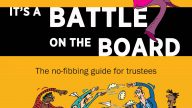Charity Leaders - You have to put your own oxygen mask on first
Debra Allcock Tyler shares some practical advice on how charity leaders can cope with the mental and physical challenges of the job.
Some years ago I was in a taxi with a driver who was angry and shouty about the poor behaviour of others on the road.
Coming back from the meeting in another taxi this driver was calm and quite zen. I asked him how come he wasn’t angry about the other road users. He said, ‘If you can’t cope with the traffic, don’t be a taxi driver’.
This reminded me of a nurse friend who said to me that if you can’t handle blood, shit and death don’t be a nurse.
Which brings me to working in charities.
When we start out at any level in a charity we are rarely prepared for it, to be fair. The trope that charities are full of kind, generous, amazing people helping people who are hugely grateful for what we do, and being supported by folk who are eager to give and full of admiration for our wonderfulness, is not entirely true.
Because our sector is full of people being people – and people can be both awful and awesome in the space of a few minutes! Both those we work with and for, and those we serve.
And we operate in an imperfect society, with systems that work against anyone who is not born with advantage, and a media that stirs up shit for clicks.
And in the meantime, there is no doubt it’s hard. And it’s hard because it is hard. The problems we are dealing with are often intractable, endemic issues. And we are going to encounter difficult volunteers, ungrateful angry service users, patronising funders, challenging colleagues and arrogant trustees – and we have to learn how to handle it without breaking.
The hard, honest truth about leadership in our sector is that you have to have the emotional and mental resilience to handle it. I have advised so many CEOs over the years to look after themselves first otherwise they’ll burn out – and then they don’t take that advice – and then complain that the system broke them. But the system doesn’t break everyone, and we all have our stories – so what makes the difference?
You have to put your own oxygen mask on first. And you are your own oxygen mask.
- Set boundaries – when you will and will not work
- Don’t try to do everything – you can only do what you can do
- Share the load – don’t assume others don’t have the capacity – ask them!
- It’s an emotionally laden job – but try to separate yourself from the work. If doctors and nurses don’t create an emotional barrier they get overwhelmed – having a degree of emotional distance from work that is inherently emotional supports good mental health
- Not everything is important – work out which are the glass balls which you mustn’t drop and which are the plastic ones which you can – you will find that most of your balls are plastic
- Own your own shit. If you’re getting run down consider that it’s because you’re tired and you’re letting things get to you that when you’re feeling fresh don’t bother you so much. It may be others at fault for sure. But don’t start by blaming others. Start by taking control of what you can.
- And if it’s breaking you walk away. No job is worth the breakdown of your sense of self.
Does that advice sound a bit harsh? Unrealistic? Unsympathetic? Well, I’ve been there. I’ve had terrible boards, difficult staff, horrible financial challenges and I let it get to me and got unwell. But when I took back control of my thought processes and approach the job was still tough, but I was less overwhelmed.
Of course, some of the systems and practices in our sector don’t help, but many of us are working hard to change them and some things are changing, but it takes time. We are doing what we can at DSC to create better governance, healthier cultures and more accessible funding for our sector.
But also recognise that if it’s too much it’s ok to walk away. I tried front-line work but I don’t have the emotional or mental resilience to handle it, so I don’t do that. I’m not a nurse precisely because I can’t handle blood, shit and death. No shame in that.
We have lots of resources that will help support you in your challenging role, here’s a few things that could help you:
- It’s a Battle on the Board by Debra Allcock Tyler
- It’s Tough at the Top: The no-fibbing guide to leadership by Debra Allcock Tyler
- Wellbeing at Work for Charities 2025 – Online conference on Thursday 3 April
- Support and Supervision of Staff – Online course
- Managing Wellbeing in the Workplace – Online course


